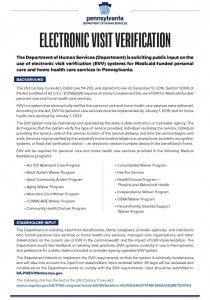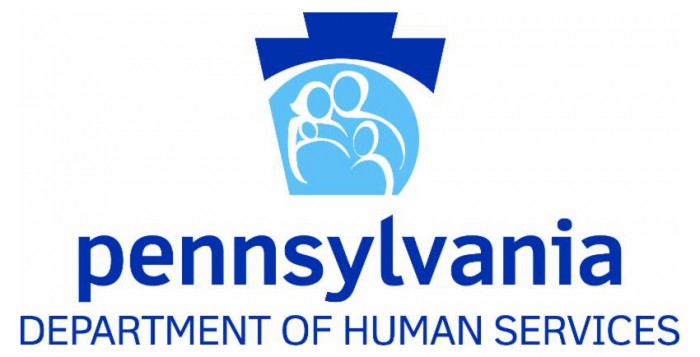The Department of Human Services (Department) is soliciting public input on the use of electronic visit verification (EVV) systems for Medicaid-funded personal care and home health care services in Pennsylvania. See announcement below and here.

Richard Edley
Enrollment Information Requests for CHC Providers
Today the Office of Long-Term Living (OLTL) issued a communication to the Home and Community-Based Service Providers that will be enrolling into the provider networks of the Managed Care Organizations (MCOs) through Community HealthChoices (CHC).
With the onset of CHC, Pennsylvania’s three Managed Care Organizations are in the process of establishing strong provider networks to support the program. In order to ensure network adequacy, the department is gathering information to establish a baseline of the number of full time equivalent (FTE) workers that are potentially needed to continue to provide services and meet the needs of the participants. Due to this requirement, the CHC MCOs will be asking providers for this information during a provider’s initial enrollment with an MCO and on an ongoing basis. The OLTL appreciates the continued cooperation of providers in ensuring a smooth transition for participants into the CHC program. If you have questions, please contact the OLTL Bureau of Quality and Provider Management, Enrollment and Certification Section at 717-772-2570.
Wolf Administration Discusses Negative Impact of Proposed Cuts to MH & SUD Funding
PA Provider Letter to Senators Toomey & Casey to Reject the BCRA
Community HealthChoices Webcast for MLTSS MAAC Meeting July 7, 2017
The Office of Long-Term Living has announced registration information for stakeholders to participate in the next MLTSS Subcommittee of the Medical Assistance Advisory Committee:
Attendance via phone/webcast:
If you wish to participate in the Managed Long-Term Services and Supports (MLTSS) Subcommittee meeting on Friday, July 7, 2017, 10:00 am to 1:00 pm, in the Honor’s Suite at 333 Market Street Tower in Harrisburg, and cannot attend in person, OLTL is offering webcast and dial-in capabilities.
To participate via webcast, please register by using the link below. We encourage those participating by webcast to register early. When registering, please verify that you entered your email address correctly. You will receive a confirmation email containing information about joining the webcast if you registered correctly. Please be advised that space is limited on the phone line.
The dial-in number is: 888-468-1160 PIN: 252190#
If you have any questions about registering for the webcast, please contact the Office of Long-Term Living.
Drug & Alcohol Director Lynn Cooper Interview with NPR on Medicaid Cuts and The Opioid Epidemic
PA Health & Wellness Contracting Overview and Training Webinar!
RCPA is partnering with PA Health & Wellness to provide a free webinar on contracting overview and training. We are preparing to ensure continued access of care for participants of the Community HealthChoices program. This webinar will review the PA Health & Wellness contract and the process to become a partner in their network.
This free webinar will be held on Tuesday, June 27, 1:00 pm – 2:00 pm EDT. Please register here. Please download the orientation file.
If you have any questions, please call Melissa J. Siwiec from PA Health & Wellness at 717-551-8020.
2017 LTSS Scorecard Results
Yesterday, the AARP Public Policy Institute released a document, Picking Up the Pace of Change, supported by the AARP Foundation, The Commonwealth Fund, and The Scan Foundation. The report, the third in a series, can be accessed online.
According to authors Susan Reinhard, Jean Accius, Ari Houser, Kathleen Ujvari, Julia Alexis, and Wendy Fox-Grage, the Long-Term Services and Supports (LTSS) State Scorecard aims to pick up the pace of improving LTSS by providing comparable state data to benchmark performance, measure progress, identify areas for improvement, and improve lives.
The goal is for the Scorecard to stimulate a dialogue among key stakeholders, encouraging them to collaborate on strategies for improving their state’s LTSS system. The LTSS State Scorecard — a compilation of state data and analysis — finds that progress toward better support for our rapidly increasing populations that are aging and living with disabilities is slow and uneven, with great variation among states. Still, states made significant improvements in a number of areas.
The two areas with the most significant declines are employment for working-age people with disabilities (21 states) and long-stay nursing home residents moving back to the community (21 states). The Scorecard shows the best, worst, and median scores on 25 indicators and can be compared across states. Pennsylvania’s Scorecard shows performance improvement in eight indicators and one performance decline since the 2014 report. Of the 50 states and the District of Columbia, Pennsylvania is ranked 36 overall and as follows in the five domains:
- Affordability & Access 37
- Choice of Setting & Provider 23
- Quality of Life & Quality of Care 25
- Support for Family Caregivers 43
- Effective Transitions 28
According to the report, this progress is not enough, even though states are inching toward spending a greater proportion of Medicaid and state LTSS funding on home- and community-based services — a positive trend because it both enables greater independence and is cost-effective. The authors urge accelerated activity so that all states reach much higher benchmarks by 2026; the year when baby boomers begin to turn 80 and begin to experience a greater need for LTSS.
State and federal officials, providers, advocates, and other stakeholders can use the data analytics in this Scorecard to see how their state compares with others and to assess both their successes and areas in need of reform in order to improve support for older people, adults with physical disabilities, and their family caregivers.
Impact of the AHCA on Pennsylvania: Multi-Association Letter
RCPA has signed onto a multi-association advocacy letter to Senators Casey and Toomey, urging them to ensure that any health care reform protects the vulnerable Pennsylvania citizens who rely on coverage provided currently by Medicaid and the Affordable Care Act (ACA).
HCBS Settings Requirements Training Available on the DHS Website
Webinar and FAQ Available on Home and Community-Based Settings (HCBS) Requirements
On March 7, 2017 and March 9, 2017, the Office of Long Term Living (OLTL) held webinar presentations on the Home and Community-Based Settings (HCBS) Requirements as described in OLTL Bulletin 59-16-14. This training was to provide guidance on the HCBS Final Rule and provide steps providers of waiver services must take in order to comply with the rule. A recording of this training, the powerpoint presentation, and an FAQ from these training sessions are now available on the DHS website.
Questions on the HCBS Final Rule should be sent via email. For questions, call 717-783-8412.
A listserv has been established for ongoing updates on the CHC program. It is titled OLTL-COMMUNITY-HEALTHCHOICES, please visit the ListServ Archives page to update or register your email address.
Please share this email with other members of your organization as appropriate. Also, it is imperative that you notify the Office of Long-Term Living for changes that would affect your provider file, such as addresses and telephone numbers. Mail to/pay to addresses, email addresses, and phone numbers may be updated electronically through ePEAP, which can be accessed through the PROMISe™ provider portal. For any other provider file changes please notify the Bureau of Quality and Provider Management Enrollment and Certification Section at 800-932-0939 Option #1.
To ensure you receive email communications distributed from the Office of Long-Term Living, please visit the ListServ Archives page to update or register your email address.

















